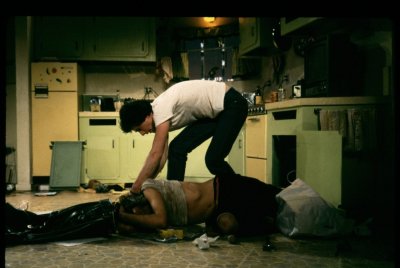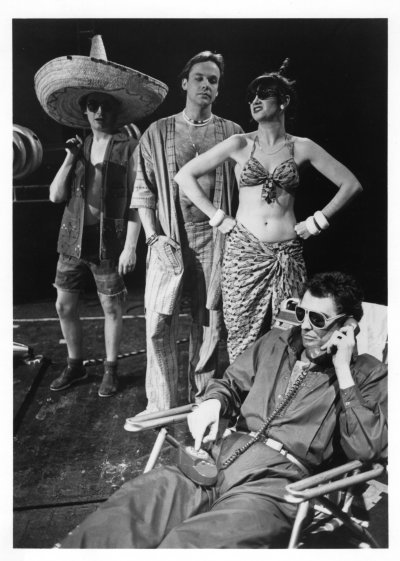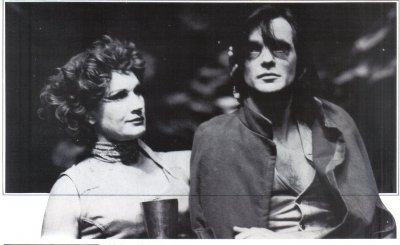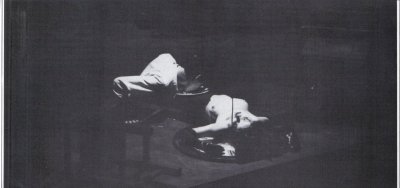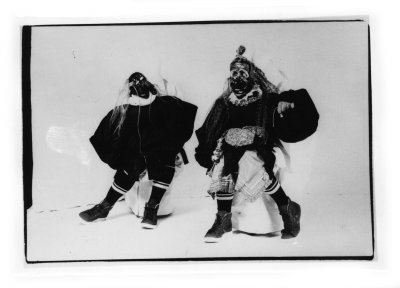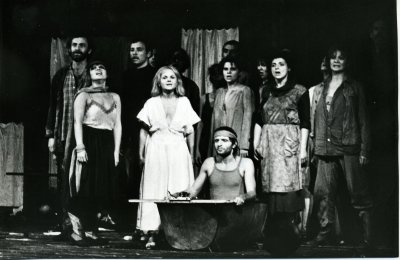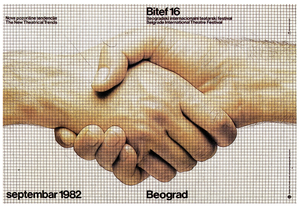
Dizajn / Design: Saveta Mašić / Slobodan Mašić (1939-2016)
16. Bitef U uvodnoj reči, za ovih petnaest godina od osnivanja BITEFA, pisali smo o svemu: o ideji Beogradskog internacionalnog teatarskog festivala, o koncepciji izbora predstava, o tendencijama razvoja savremenog svetskog pozorišta, o razlici između avangarde i novih pozorišnih tendencija, o klasici na nov način, o izlasku pozorišta u nove prostore, o stilu teatra ovog milenija, pokušavajući da lansiramo novi termin fin de millenaire, po ugledu na termin fin de siecle, ali nikada nismo pisali o značajnom aspektu u ostvarivanju ideje BITEFA – a to je odnos BITEFA i svetske ekonomske situacije.
Razmišljajući i pišući o tome reklo bi se da ta tema nema svoj umetnički aspekt i da nije ni u kakvom odnosu sa samom suštinom ideje BITEFA.
Beogradski internacionalni teatarski festival osnovan je 1967. godine u vreme izvesnog ekonomskog buma, kako u našoj zemlji, tako i u svetu. Ne raspravljajući kako se iz godine u godinu kretala krivulja svetske ekonomije tokom narednih petnaest godina, možemo konstatovati da se danas svet nalazi u izrazitoj ekonomskoj recesiji, koja je naravno zahvatila i našu zemlju. Odgovor na to su mere, koje su obuhvaćene rečju stabilizacija. Kako ostvariti program međunarodnog festivala u takvim uslovima? BITEF se opredelio za maksimalnu proveru vrednosti predstava, blagovremenu saradnju sa stranim partnerima i istinsku potragu za novim vrednostima u svetu i kod nas.
Jedan duhoviti strani diplomata, savetnik za kulturu, rekao je tokom naših pregovora na simpatično iskvarenom srpskohrvatskom jeziku:
Ali i mi imamo naša stabilizacija!
I tačno, sve zemlje godine 1982. imaju neku svoju stabilizaciju, kojoj daju različite nazive.
Pa ipak…
Sjedinjene Američke Države, u doba kada je proglašen reaganomics, znači uzdržavanje države od ekonomske intervencije svake vrste, pogotovo u kulturi, upravo ove godine u do sada najvećem iznosu dotira jednu svoju trupu za dolazak na BITEF; Rumunija, u kojoj se bije bitka za svaku kaloriju, šalje na BITEF svoju najspektakularniju predstavu; Sovjetski Savez, u kom se sprovodi štednja i na planu kulturne politike sa inostranstvom, šalje svoju četvrtu pozorišnu trupu u Jugoslaviju upravo na BITEF; Savezna Republika Nemačka već ne znamo po koji put, preko Geothe instituta, pokriva obilne troškove svoga predstavnika; Nemačka Demokratska Republika takođe obilno dotira jedno od svojih najboljih pozorišta; Mađari svoje najživlje pozorište, teatar iz Kapošvara, već drugi put u ovoj godini šalju preko jugoslovenske granice; Čehoslovaci podvode svoj ansambl pod program kulturne saradnje, iako formalno ove godine nije predviđen dolazak trupe na BITEF; Italijani, pored komplikovane procedure za odobravanje dotacije za odlazak nekog pozorišta u inostranstvo, daju pozamašnu sumu za Teatro de la Maschera iz Rima; Finci svom „Gospodinu Prtljagu“ plaćaju ceo prtljag i put za umetnike iz dalekog Helsinkija da bi Finska prvi put bila zastupljena na BITEFU. I najzad Japanci, sami umetnici, žrtvuju se i u Beograd dolaze pod najskromnijim uslovima da bi otvorili ovogodišnji BITEF u Centru Sava. Najzad, sam Beograd, glavni grad SFRJ, koji se bori sa višestrukim ekonomskim teškoćama, odlučio se da sačuva svoje međunarodno afirmisane festivale, među kojima i BITEF. Republike, koje imaju svoje predstavnike na BITEFU, pomažu finansijski dolazak svojih predstavnika. Ovog puta to su SR Hrvatska i prvi put na BITEFU – SR Bosna i Hercegovina. U ovom svetu loših vesti, malo dobrih namera i retkih nulta opcija kada je u pitanju oružje, u BITEFU imamo skroman, ali očigledni primer dobre volje svih, pre svega nas samih, pa onda drugih naroda da se prevaziđu granice okolnosti i da se, uprkos ekonomskim teškoćama, okupi u Beogradu nešto što se može nazvati nekom vrstom plemenitog luksuza Svetskog pozorišnog duha.
Mira Trailović i Jovan Ćirilov
BITEF AND THE WORLD ECONOMIC SITUATION
In our forewords over these fifteen years since BITEF was established, we wrote on everything: the idea of the Belgrade International Theatre Festival (BITEF); on the conceptions of the selection of plays; on the development tendencies of the contemporary world theatre; on the differences between the avant garde and the new theatrical tendencies; on classics in modern presentation; on the exit of the theatre into new spaces; on the style of the new millenium – all in an attempt to launch a new term, fin de millénaire after the model of fin de siècle.
However, we never wrote on the important aspect of the implementation of the ideas of BITEF in relation to the world economic situation.
Writing and pondering over this, it would appear that the theme does not have any artistic aspects nor that it is in any way whatsoever related to the essential ideas of BITEF.
The Belgrade International Theatre Festival (BITEF) was inaugurated in 1967, at the time of a certain economic boom in Yugoslavia and abroad. Without going into the ups and downs registered on the world economic charts in the fifteen years that followed, it is clear that the world at present is in a obvious economic recession which has, of course, affected Yugoslavia too, where the struggle against it consists of a series of steps referred to as the stabilisation.
How is one to implement a programme of an international festival under such conditions?
BITEF opted for maximum veting of values of plays, timely cooperation with foreign partners and a true search for new values in the world and in Yugoslavia.
A witty diplomat, a cultural counselor, commented during our negotiations in charming poor Serbo-Croat: Ach, we also our o’n schtabilization have.
True. All countries in 1982 face their own stabilisation which they call different names.
Nevertheless…
The United States of America, at the time when reaganomics are being launched, i.e. avoidance of state financial intervention of any kind, in particular in culture, has this very year granted the largest subvention to one of its ensambles to enable it to participate in BITEF; Romania, where battles are waged for every single calorie, sends its most spectacular play to BITEF; the Soviet Union, in which cuts have been made in the field of foreign cultural policy, is sending its fourth theatrical ensamble succession to Yugoslavia, to BITEF; the Federal Republic od Germany, God knows how many times now, is covering the highs costs of sending its representatives through the Goethe Institute; the Democratic German Republic too is financing one of its best theatre; the Hungarians are sending the Kaposvár Csiky Gergely színház – one of their best – for the second time this year across the Yugoslav border; the Czechoslovaks are placing their ensamble under the label of cultural cooperation, although formally no provision has been made for any group attending the BITEF this year; the Italians, in spite of a complicated procedure for getting a subsidy through for a theatre to go abroad, are giving a substantial sum of money to the Teatro de la Maschera of Rome; while the Fins are paying their Mr Luggage full luggage and travel costs of the actors from distant Helsinki to have Finland represented for the first time at the BITEF. And finally, the Japanese, the artists themselves, are making a sacrifice and coming under extremely modest conditions so as to open this year’s BITEF at the Sava Centre.
Finally, Belgrade itself, the capital of the Socialist Federal Republic of Yugoslavia, struggling with manyfold economic problems, decided to preserve its internationally aclaimed festivals and BITEF among them. The Republies which have their representatives at BITEF are subsidising their attendance. This time these are the Socialist Republic of Croatia and, for the first time at BITEF, the Socialist Republic of Bosnia and Herzegovina.
In this world of bad news, a few good intentions and rare “zero options” when speaking of armament, we have within BITEF a modest but obvious example of good will of all, first of all our own and then of others, to cross the frontiers of circumstances and in spite of economic problems, to gather in Belgrade something one could refer to as the noble luxury of the World theatre spirit.
Mira Trailović and Jovan Ćirilov
Glavni program / Main programme
247 Sankai Juku (Tokio, Japan); Ušio Amagacu: Dečak sa mandarinom; režija: Ušio Amagacu (Specijalna nagrada) / Sankai Juku (Tokio, Japan); Ushio Amagatsu: Kinkan Shonen (The Kumquat Seed); direction: Ushio Amagatsu (Special Award)
248 Teatrul Mic (Bukurešt, Rumunija); Mihail Bulgakov: Majstor i Margarita ; režija: Katalina Buzojanu / Teatrul Mic (Bucharest, Romania); Михаи́лАфана́сьевичБулга́ков (Mikhaíl Bulgakov): Maestrul şi Margareta (The Master and Margarita); direction: Cătălina Buzoianu
249 Würtembergische Staatstheater (Štutgart, Savezna Republika Nemačka); Klaus Man, Ariane Mnuškina: Mefisto; režija: Hansginter Hajme / Würtembergische Staatstheater (Stuttgart, Federal Republic of Germany); Klaus Mann, Ariane Mnouchkine: Mephisto; direction: Hansgünter Heyme
250 American Repertory Theatre (Boston, Sjedinjene Američke Države); Sem Šepard: Pravi Zapad; režija: Dejvid Viler / American Repertory Theatre (Boston, United States of America); Sam Shepard: True West; direction: David Wheeler
251 American Repertory Theatre (Boston, Sjedinjene Američke Države); J. B. Molijer: Zganarel; režija: Andrej Šerban / American Repertory Theatre (Boston, United States of America); J. B. Molière: Sganarelle; direction: Andrei Şerban
252 American Repertory Theatre (Boston, Sjedinjene Američke Države); Frenk Vedekind: Lulu; režija: Li Brujer / American Repertory Theatre (Boston, United States of America); Frank Wedekind: Lulu; direction: Lee Breuer
253 Narodno pozorište (Mostar, Jugoslavija); Majčina sultanija Svetozara Ćorovića – prema delu Svetozara Ćorovića; dramatizacija: Milosav Marinović; režija: Miloš Lazin / National Theatre (Mostar, Yugoslavia); Majčina sultanija Svetozara Ćorovića – based on a piece by Svetozar Ćorović; dramatisation: Milosav Marinović; direction: Miloš Lazin
254 Divadlo na Zábradli (Prag, Čehoslovačka); V. Šekspir: Hamlet; režija: Evald Šorm / Divadlo na Zábradli (Prague, Czechoslovakia); W. Shakespeare: Hamlet; direction: Evald Schorm
255 Teatro La Maschera (Rim, Italija); Eliogabalo (Heliogabalo); režija: Meme Perlini / Teatro la Maschera (Roma, Italy); Eliogabalo; direction: Memè Perlini
256 Deutsches Theater (Berlin, Nemačka Demokratska Republika); Georg Bihner: Dantonova smrt; režija: Aleksandar Lang (Grand Prix) / Deutsches Theater (Berlin, German Democratic Republic); Georg Büchner: Dantons Tod (Danton’s Death); direction: Alexander Lang (Grand Prix)
257 Teatar ITD (Zagreb, Jugoslavija); V. Šekspir,Tom Stopard: Hamlet; režija, lutke, itd.: Zlatko Bourek / ITD Theatre Company (Zagreb, Yugoslavia); William Shakespeare,Tom Stoppard: Hamlet (A Fifteen Minute Hamlet); direction, dolls, etc: Zlatko Bourek
258 Helsingin Kaupunginteatteri (Helsinki, Finska); Gospodin Prtljag (Mr Luggage); režija: Sepo-Ilmari Sitonen / Helsingin Kaupunginteatteri (Helsinki, Finland); Mr. Matkatavara (Mr Luggage); direction: Seppo-Ilmari Siitonen
259 Csiky Gergely Szinhàz (Kapošvar, Mađarska); Peter Vajs: Mara-Sad; režija: Janoš Ač (Grand Prix, Nagrada Politike, Nagrada publike) / Csiky Gergely Szinhàz (Kaposvár, Hungary); Peter Weiss: Marat-Sade; direction: János Ács (Grand Prix, Politika Award, Audience Award)
260 Національний академічний драматичний театр імені Івана Франка (Kijev, Savez Sovjetskih Socijalističkih Republika); Ivan Franko: Ukradena sreća (Украдене щастя); režija: Sergej Dančenko / Ivan Franko National Academic Drama Theater (Kiev, The Union of Soviet Socialist Republics); Іван Якович Франко (Ivan Franko): Украдене щастя (Stolen Happiness); direction: Сергей Владимирович Да́нченко (Serhiy Danchenko)
Your Content Goes Here





